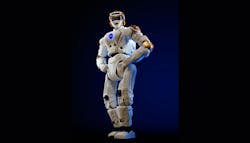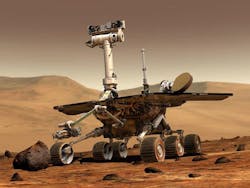The Machines Are Taking Over Space Exploration
People concerned about robots taking away jobs might want to consider where it’s already happened. Machines with varying levels of intelligence have quietly taken over the most glamorous, coveted and admirable job in the world -- space exploration.
It’s not that people can’t still be astronauts -- it’s just there aren’t nearly enough jobs for all the people with the desire and ability to do it. And in terms of gathering data, we can’t catch up to the robots, which have in recent years been plunging beneath Jupiter’s thick cloud cover and exploring the exotic moons of Saturn with their methane lakes and roiling ice geysers. At more then 11 billion miles from home, the unmanned space probe Voyager 1 has finally reached the edge of the sun’s “atmosphere” of solar wind particles and sampled true interstellar space.
Perhaps human space flight will start to take a cue from Elon Musk’s roadster now playfully speeding away on an orbit around the sun. In the future, going into space might become less of a solemn duty carried out by a hand-selected few, and more of an adventure, done both for learning and fun. This will take some attitude adjustment, given that the U.S. has been the traditional leader in space exploration, and we are a puritanical people, deeply suspicious of fun.
The panel’s co-chair, Cornell University planetary scientist Jonathan Lunine, said they concluded that science alone isn’t quite enough to justify sending people on a Mars mission. But sending humans to Mars could give the U.S. a chance to display leadership in peaceful international cooperation, he said, and could inspire the public. So the justification for going to Mars would combine scientific goals with “economic, political and aspirational” ones.
What is "aspirational" if not a respectable term for fun and adventurous? Lunine said his panel concluded it would take another 30 years to get humans to Mars, during which time robot technology may advance in ways we can’t predict. They may be able to make the journey safer and better in ways we can’t imagine now.
Meanwhile, robotic missions will help answer the big questions. Scientists are still hoping to learn more about how our solar system formed. The search for alien life continues, boosted by the surprise finding that there are seas with the potential for harboring life on Saturn’s moon Enceladus, as well as on Jupiter’s Europa. And now instead of just nine planets, we have eight planets and scores of other worlds out beyond Pluto -- Makemake, Quaoar, Sedna and Varuna, to name a few. It’s human nature to want to see what’s out there, even if we can’t go in the flesh.
Commercial vehicles such as SpaceX’s Falcon Heavy, which launched the spacefaring roadster, will probably figure into the quest, said Lunine, since there’s a shortage of powerful rockets and no shortage of ideas for missions that need to be lofted far into space. Scientists have drawn up plans for potential missions to look closer at those distant moons of Jupiter and Saturn for signs of life, and there are plans for exploring Uranus and Neptune, which hold particular fascination since astronomers have found many bodies like them in other solar systems.
Perhaps these missions will be long ago accomplished by the time that car is predicted to swing close enough to be visible from Earth -- roughly estimated to be around 2073. If history is any guide, we and our robots will still be exploring, launching missions to answer new questions that nobody has yet thought to ask.
by Faye Flam


